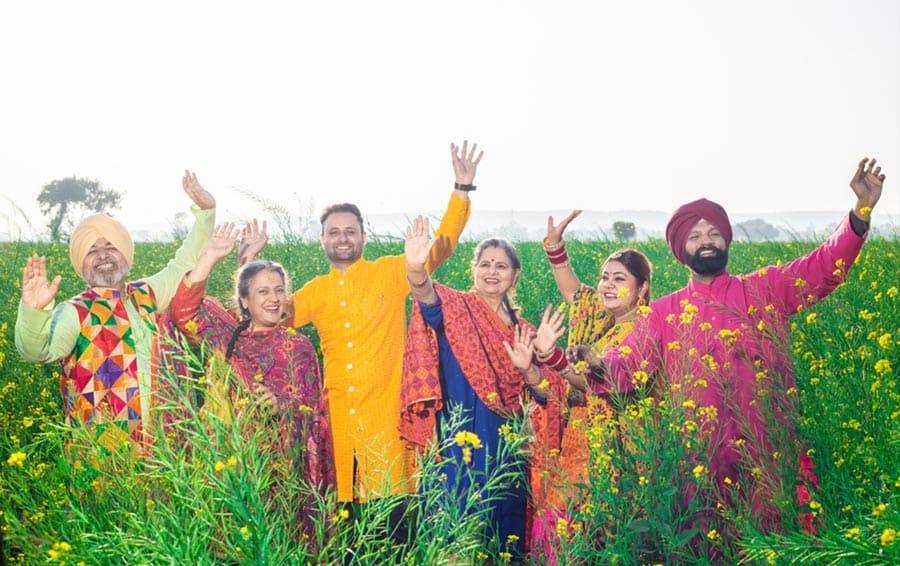
Welcome to the vibrant celebration of the Festival of Baisakhi! On April 13th, 2024, communities around the world will come together to honour this auspicious occasion, steeped in tradition, culture, and joy. Baisakhi, also known as Vaisakhi, marks the Indian Solar New Year and holds immense significance for Hindus and Sikhs alike. Let's search into the nature of this harvest fest and explore its rich kingdom of rituals and celebrations.
Baisakhi embodies the spirit of new beginnings, abundance, and community solidarity. As a harvest festival, it symbolises the joy of reaping the fruits of labour and expressing gratitude to the earth for its bounty. For Sikhs, Baisakhi holds additional significance as it marks the Sankranti of Vaisakh, commemorating the formation of the Khalsa Panth by Guru Gobind Singh Ji in 1699. It is a time of spiritual renewal and rededication to Sikh values of equality, justice, and service.
The celebrations of Baisakhi are a sight to behold, brimming with color, music, and festivity. The day begins with devotees gathering at gurdwaras for prayers and religious songs, followed by the grand procession of the Guru Granth Sahib, the holy scripture of Sikhism. The air resonates with the infectious beats of the Bhangra, a spirited folk dance performed by men and women dress up in vibrant attire.
Another hallmark of Baisakhi festivities is kite flying, where the sky transforms into a canvas of swirling colors as families engage in friendly duels with their beautifully designed kites. Meanwhile, households bustle with activity as aromatic delicacies like Khichdi, Makki Roti, and Sarson ka Saag are prepared to indulge in communal feasts.
Melas and fairs spring to life in every nook and corner, offering a treasure trove of delights ranging from local handicrafts to mouth-watering street food. It's a time for joyous reunions, laughter, and revelry as communities come together to celebrate the Baisakhi Festival.
While Baisakhi is celebrated with fervour across India, each region adds its unique flair to the festivities. In Punjab, the heartland of Baisakhi celebrations, the festival coincides with the ripening of the rabi crop, marking the beginning of the agricultural cycle. The state brims with energy as farmers rejoice and offer prayers for a bountiful harvest during the Jal Utsav.
In Assam, Baisakhi takes on the avatar of Bihu, a joyous festival marked by traditional dance performances, feasting, and merriment. The air reverberates with the melodious strains of Bihu songs as communities come together to celebrate the vibrancy of Assamese culture.

Even if you're miles away from the heartland of Punjab or belong to a non-Punjabi community, you can still partake in the joyous spirit of Baisakhi. Host a Baisakhi themed gathering with friends and family, complete with traditional music, dance, and cuisine. Whip up delicious Punjabi delicacies using online recipes, or explore local markets for festive decorations and attire.
Reach out to your local Punjabi community or cultural centre to join in their Baisakhi celebrations and forge new connections. Embrace the spirit of inclusivity and cultural exchange as you immerse yourself in the vibrant Kingdom of Baisakhi festivities.
As we revel in the joyous celebrations of Baisakhi, let us not forget the deeper significance of this auspicious occasion. Baisakhi reminds us to express gratitude for the abundance in our lives, cultivate a spirit of renewal, and strengthen our bonds of community and kinship. Let us carry the values of Baisakhi - unity, generosity, and compassion - into our daily lives, enriching our relationships and fostering harmony in our communities.
As we bid adieu to another joyous Baisakhi celebration, let us cherish the memories we've created and carry forth the spirit of renewal and unity in our hearts. May the blessings of this auspicious festival usher in a year filled with prosperity, peace, and fulfilment. Happy Baisakhi to one and all!
Q: What is the significance of Baisakhi in Sikhism?
A: Baisakhi holds immense significance in Sikhism as it marks the formation of the Khalsa Panth by Guru Gobind Singh Ji in 1699, symbolising the birth of the Sikh community.
Q: How is Baisakhi celebrated in Punjab?
A: In Punjab, Baisakhi is celebrated with grand processions, traditional dances like Bhangra, kite flying, and communal feasts featuring delicacies like Sarson ka Saag and Makki Roti.
Q: What is the historical significance of Baisakhi?
A: Historically, Baisakhi marks the solar new year and the onset of the harvest season in India. It is also associated with significant events in Sikh history, including the formation of the Khalsa Panth.
Q: How can I celebrate Baisakhi if I'm not from a Punjabi background?
A: You can celebrate Baisakhi by hosting themed gatherings, trying out Punjabi recipes, or participating in local Baisakhi events organized by cultural centers or communities.
Q: What is the spiritual significance of Baisakhi?
A: Baisakhi holds spiritual significance as a time of renewal, gratitude, and rededication to Sikh values of equality, justice, and service, as exemplified by the
formation of the Khalsa Panth.
For more Interesting topics follow us on Instagram
Author :